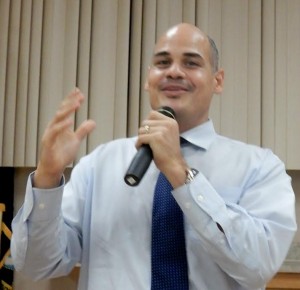
Several hundred Parkinson’s Disease patients and their caregivers filled the American Legion Post #347 on Friday to hear presentations by key physicians and other healthcare providers from the University of Florida’s Movement Disorder and Restoration Department. A lunch, provided by the National Parkinson Foundation, was served after the nearly three-hour session.
Villagers Ed and Helene Ziegler and Clermont residents Rupert and Delrose Brown, found the lectures to be outstanding, because the specialists dealt with disease-related issues which are sometimes overlooked during doctor visits and in printed materials about PD. The presenters’ expertise, light-hearted humor and compassionate tone were appreciated by audience members.
Ramon Rodriguez, MD, a neurologist specializing in Parkinson’s Disease, began by taking pictures of the audience. “I have to show my wife these pictures,” he said with a chuckle, “so she will know where I was today — to prove to her that I was not out golfing.”

“Neurologists treat the major PD symptoms, like tremors, stiffness, walking and balance issues — and I’m sure you all know about that,” Rodriguez continued,” so today I will focus on other problems many Parkinson’s patients face which are not directly movement-related — but are nonetheless bothersome and important — like LOW blood pressure, neurogenic orthostatic HYPOtension (i.e., dizziness when one stands up), constipation, sweating, anxiety, depression and neuropathies.”
Rodriguez explained there is no one perfect blood pressure level — each patient must learn the individual threshold beyond which dizzyness or fainting may occur. He emphasized the vital importance of water to help regulate blood pressure — several large glasses, or up to 64 ounces per day. Eating food with high sodium content, and using the salt shaker also might help to ELEVATE blood pressure. “This may be contrary to a lot of doctors’ advice,” Rodriguez quipped, “but anything that comes in a can has high sodium content — so buy it and eat it.”
Dr. Rodriguez strongly advocates compression stockings. “They’re comfortable,” he said. “They come in fashionable colors, even for men. Once you put them on and forget about them, they work all day.” He recommended patients discuss blood pressure medications with their doctors — both pills that lower the blood pressure, and those which, through various mechanisms of action, help to raise it.
Drinking water also helps with constipation, as will eating fruits and vegetables to increase fiber. He suggests Metamucil, prune juice and prudent use of OTC stool softeners and gentle laxatives like milk of magnesia. If all else fails, he writes the prescription-only agent, Lactulose, He said not much can be done about sweating, but mentioned trans-urethral IV Botox as a last resort for patients with intractable urinary incontinence. Dr. Rodriguez advocates B-complex vitamins to help with neuropathies, including monthly Vitamin B12 injections for some PD patients whose oral medications might not be well absorbed.

“The future holds promise,” Dr. Rodriguez said. “‘Race PD’ is coming — enabling doctors to see and treat PD patients via special computer and cell phone software. A dopamine inhaler is on the horizon, as a rescue medication when regular dosages fall short…and a dopamine pump is in the works. Managing Parkinson’s Disease is all about maintaining stability — and smooth medication dosages are the way to go.”
Stacy Merritt, M.A., addressed the often overlooked caregivers — meaning anyone who actively advocates for Parkinson’s patients and has responsibility for their overall care.
“Nearly two-thirds of caregivers — 62 percent– die before their patients do,” she said “because they don’t take care of themselves. They are also aging, and have their own medical conditions — but tend to focus only on the PD patient. They may miss meals and sleep, and be overburdened with constant tasks. Caregivers are under tremendous tension and need respite.. Many suffer in silence from anxiety and depression, and some even feel guilty for not being able to ‘do it all.'”
“Don’t be afraid to ask for help,” Merritt emphasized over and over. “There are many good resources out there — don’t hesitate to use them,” she asserted. “Get help from support groups, adult day care; from family, friends and neighbors, clergy and members of your church or temple. If you don’t ask, people may not know what you need. Also, you need to get away from the disease — take a break. Get a manicure, read a book, go to BINGO, or get a massage — these are all excellent things caregivers can do for themselves. A break of even fifteen minutes or an hour can help tremendously. A movie; a bubble bath, or energy meditation. Get help with cleaning, cooking, gardening, taxes — and take a day trip if possible.”
Merritt mentioned pervasive patient resistance to getting help. “It is difficult for patients to give up personal autonomy and car keys,” she said. “Legal arrangements also must be made, like powers of attorney, wills and trusts and funeral arrangements. PD is a progressive degenerative disease — so arm yourself with good information, and get your affairs in order. Get everything in writing. No one wants to talk about these things,” Merritt cautioned, “but it is best done while cognitive functions are still sharp. If one waits, family squabbles often ensue when no one knows the patient’s wishes.”
Valerie Rundle-Gonzalez MD discussed beneficial complementary medicine — including chiropractic, massage therapy, psychological and dietary counseling, but dismissed many ‘alternative medicine’ approaches as having insufficient proof to be recommended. “Many antioxidants, which soak up free radicals, certainly won’t hurt you — but they have not proven to help specific PD symptoms so far. She included vitamins C and E and CoQ10 in this discussion — but said supplements and some herbal substances bear further study.
“Ginger is excellent for nausea and vomiting,” Merritt suggested, “as a spice or in tea. St. John’s Wort ( Hypericum Perforatum) works similarly to selective serotonin re-uptake inhibitor antidepressants (SSRIs) for mild depression, but it is imperative all herbs be discussed with physicians because of possible interactions with PD medications, blood thinners and other drugs. All of the presenters believe medical marijuana, if legalized, needs study to ascertain if it is helpful for Parkinson’s Disease symptoms.
UF Associate Biomechanics Professor, Dr. Chris Hass’ talk, entitled ‘Walking Around the Basal Ganglia’ utilized many charts with Gator team colors — orange and blue. “One thing which we have reams of data to prove, is that exercise benefits Parkinsonism patients — both short and long term. So I recommend you mix as much exercise as you are able to do with more sedentary activities, like your computer or television.
PD is a degenerative Central Nervous System disorder with motor symptoms resulting from the death of dopamine-generating cells in the substantia nigra region of the mid-brain. The cause is unknown, but it’s all about balance and preventing muscle weakness. Falls and hospitalization can be devastating, and PD medications don’t help sensory orientation, motor coordination, biomechanics of walking and gait very much. He recommended modest strength training, with weights, and treadmill exercises. Exercise helps with accompanying illness also — like osteoporosis, pain, cardiovascular disease, psychological and sleep disorders.

